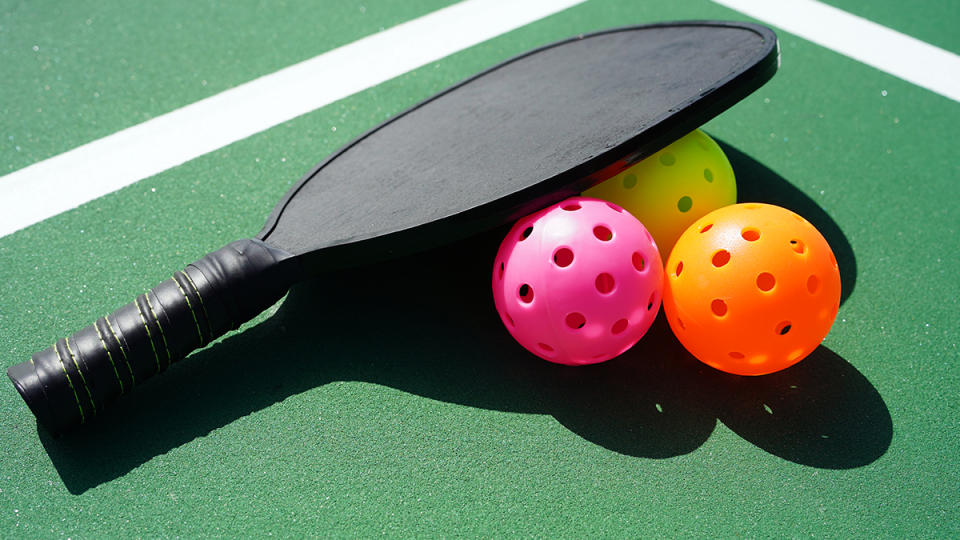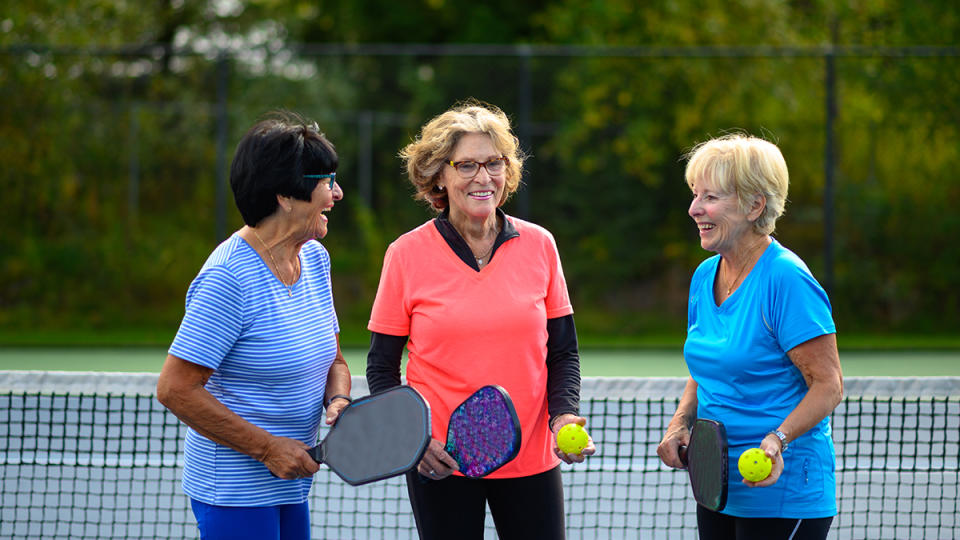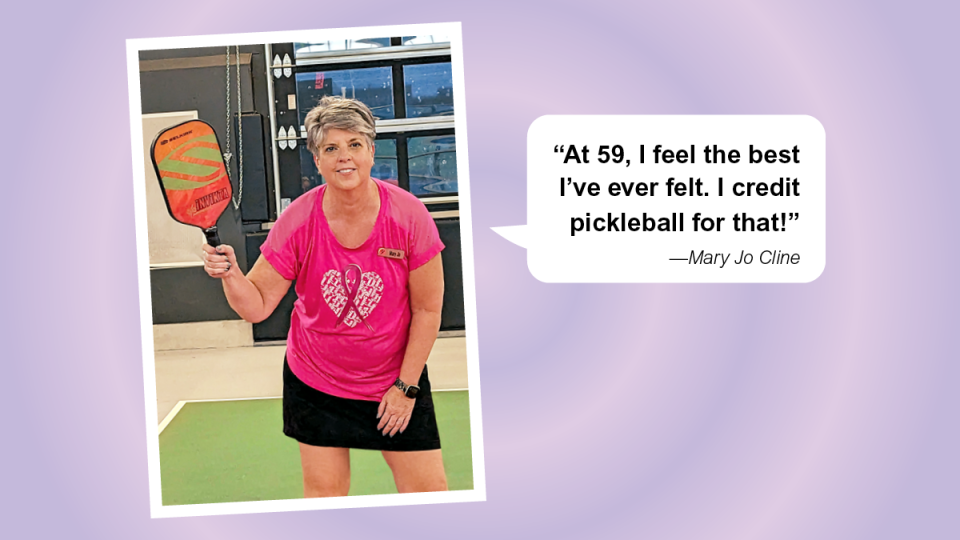Pickleball Delivers A Wide Range of Health Benefits — Discover How It Lifted One Woman's Serious Depression
These days it seems everyone is playing pickleball. Pickeball courts are cropping up on every corner, and fans of the sport range from kids and young adults to men and women in retirement. Even fitness pro Denise Austin is a pickleball fan! And the benefits of pickleball are far-ranging: Not only is it a great workout, it's also inexpensive, easy to learn and it's a great way to socialize. Read on to hear what doctors say about the impressive health benefits pickleball delivers, then keep reading to learn how the court sport helped one woman heal after years of depression.
What is pickleball?

Pickleball was created in 1965 out of boredom when a Washington state congressman and his friend were looking for something to do. They started playing around with ping pong paddles on a badminton court, and pickleball was born! The sport, which is played with ping-pong-like paddles and plastic balls, grew in popularity over the next several decades, but it wasn't until 2021 that it really exploded, becoming the fastest-growing sport in America, according to the Sports and Fitness Industry Association.
Pickleball is best described as a cross between tennis, badminton and ping pong. Typically, four people play at a time (doubles), but it can also be played in singles. (Click through for details on the rules and more about what pickleball is and the best pickleball shoes for women.)
5 health benefits of pickleball
As the pickleball craze has spread throughout the world in recent years, something interesting has happened: Research finds that playing the sport not only helps people get physically fit, it also enhances emotional, psychological and cognitive health and well-being. Read on for more on the benefits of pickleball.
Pickleball benefit 1: It torches calories
We all know that exercise can have a variety of positive effects on your health, especially on your heart, lung, and brain function and your state of mind. What's more, it's a great calorie burner: A 150-pound woman can burn upwards of 230 calories in a 30-minute game of pickleball. It's a full-body workout that improves physical fitness by getting your heart rate up (singles more so than doubles!), and it also works the muscles in your back, core, arms and legs.
Pickleball benefit 2: It keeps your brain young
Playing pickleball improves blood flow to the brain — and that's an amazing thing for your brainpower. But that's not all: While playing pickleball, “you create a lot of good chemicals in the brain from moving, changing direction, turning around, having to balance and the hand-eye coordination — all of those demand a lot from the brain,” explains John Ratey, MD, a clinical associate professor of psychiatry at Harvard Medical School.
Indeed, a study in a 2021 issue of the International Journal of Environmental Research and Public Health found that when previously sedentary adults in Utah began playing pickleball three times per week, they experienced improved cognitive function (a term that encompasses a range of mental functions including memory, perception, reasoning, decision-making and language comprehension) on various neuropsychological tests. They also gained an enhanced overall sense of well-being, including a boost in mood and self-confidence, and they expressed a desire to stick with it after the six-week study period.
And if you play pickleball outdoors, you may experience even more brain benefits: Research has found that exercising outdoors improves focus and social interactions more effectively than doing physical activity indoors — and people find the same workout feels easier outside. Plus, performing the repetitive movements that are required in pickleball can help you focus and brighten your mood, say Dr. Ratey, author of Spark: The Revolutionary New Science of Exercise and the Brain. Believe it or not, “65% of the brain is devoted to helping us move better,” he adds. “When you do that, you feel less stressed or anxious.”
A study in a 2020 issue of the Journal of Aging and Physical Activity found that one of the primary motivations among older adults wanting to learn how to play pickleball is to gain a sense of mastery as they embrace difficult training techniques. Having a sense of mastery is a boon for cognitive function, self-esteem and mood, experts say.
Pickleball benefit 3: It boosts your mood
So many studies show regular exercise can ease depressive symptoms, improve self-esteem and positively affect quality of life that it's even led to a new proposed subspecialty of ‘lifestyle psychiatry,’ which promotes the use of exercise as an "adjunctive treatment” for people with major depressive disorder, say researchers in a 2023 issue of the journal Progress in Cardiovascular Diseases.
What's more, A study in a 2021 issue of the Journal of Happiness Studies found that pickleball participation was associated with greater general happiness among 208 adults ages 50 to 83. Meanwhile, a study involving 896 adults published in a 2022 issue of the journal Leisure Sciences found that higher participation in physical activity and spending more time outside and engaged in hobbies had a protective effect against developing symptoms of depression during the Covid-19 pandemic. Playing pickleball checks all three of these boxes.
When you play pickleball, you experience changes in brain chemistry — involving serotonin, dopamine, endorphins, endocannabinoids and oxytocin, in particular — that can improve mood, anxiety and motivation. What’s more, the release of oxytocin, which is often called the “love hormone” or the “cuddle hormone,” “not only makes you feel more positive but also makes you feel more positive toward others — you affiliate with others,” Dr. Ratey explains. And that leads into the final benefit of pickleball — keep reading!
Pickleball benefit 4: It can help you live longer!

Playing pickleball requires teamwork and cooperation with others. And that social interaction is incredibly good for you. “You’re doing this thing together that leads to bonding and a sense of camaraderie even if you don’t have other things in common,” says Jennifer Heisz, PhD, an associate professor of kinesiology at McMaster University in Ontario, Canada, and author of Move the Body, Heal the Mind: Overcome Anxiety, Depression, and Dementia and Improve Focus, Creativity, and Sleep. “Being accountable to others you’re playing is huge — you don’t want to let them down so you show up even if you don’t feel like it. That leads to consistency, which is key.” Adds Dr. Ratey, “You can’t overemphasize the [importance of social] connection and what that does for the brain in raising good hormones.” Indeed, research shows that having strong social ties is key to a longer, happier life, and people with a larger social network are about 45% less likely to die than those who are less social.
The bottom line
It’s the blend of the social aspects, the mental aspects and the physical aspects of the sport that is particularly beneficial, according to Dr. Heisz. “That’s the trifecta you need for the proliferation of new brain cells, especially in the hippocampus, which is important for memory and stress regulation,” she says.
"Ultimately, pickleball “is fun, it’s easy, and it gets people connected,” Dr. Ratey says. “Feeling connected is a powerful drug for the brain. In a world that’s dominated by loneliness, this is a big deal.”
Keep reading to see how pickleball helped one woman overcome depression.
Pickleball success story: Mary Jo Cline, 59

"You need to come home,” Mary Jo Cline choked, calling her husband at work. Mary Jo had suffered from depression on and off for years, but after giving birth to her second child in 1995, it worsened. This day, she just couldn’t stop crying.
Realizing she needed help, Mary Jo checked into an 8-week outpatient program and started taking prescription antidepressants. But despite the program and ongoing therapy, Mary Jo continued to suffer through years of sadness, anxiety, and worry about her self-worth. Her depression became even more intense as she lost loved ones and fought two battles with cancer.
At times, Mary Jo was impatient and even hostile, and her brain fog made it hard to get through a normal day. She became socially withdrawn, and when her daughters got older, she would take them to school, go back to bed and count the hours until the day would end.
Mary Jo's pickleball prescription
Doctors encouraged her to get out and exercise, but Mary Jo wasn’t naturally athletic. Also, she suffered from neuropathy and needed medication for chronic nerve pain. No matter what type of exercise she tried, she never could stick with it for very long.
Then, one day in 2015, Mary Jo happened to witness a pickleball game, and it piqued her interest. She recognized her daughters’ high school tennis coach on the court and asked her about the game. Watching them play, and seeing that it was low-impact and easy to learn, she was intrigued. I think this is a game I could get into, Mary Jo hoped.
Soon after, Mary Jo showed up to a game and was quickly hooked. She not only had fun, but also got a good workout that didn’t worsen her pain. In fact, she walked off the court feeling mentally and emotionally better than she had in years.
How pickleball improved Mary Jo's mental health
Soon, Mary Jo began playing pickleball three times a week, from two to three hours each time. To her surprise and delight, she immediately felt her mental state improve. It’s amazing, she thought. I feel less brain fog, and I am so much happier in general!
Mary Jo also realized how much she enjoyed the healthy competition and being a part of such a supportive, positive community, which worked wonders to help improve her self-esteem. She even made a few good friends on the courts and has kept in touch with other competitors she’s met at local pickleball festivals.
Today, Mary Jo is thrilled by all the ways the game has changed her life. “At 59, I feel the best I’ve ever felt mentally, physically, and emotionally,” says Mary Jo, who no longer takes medication for depression. “I really do credit pickleball for that!” sunshine into your life.
This article originally appeared in our print magazine, Woman's World.
This content is not a substitute for professional medical advice or diagnosis. Always consult your physician before pursuing any treatment plan.
For more stories natural depression cures, keep reading!
How and Why Weighted Blankets Help to Ease Anxiety and Depression
